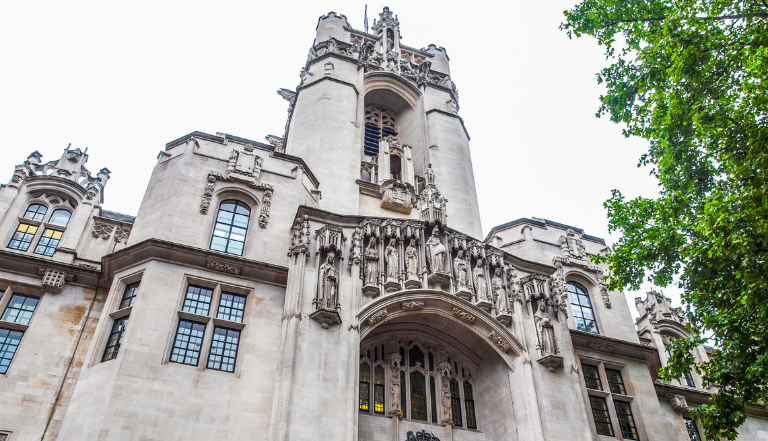We’re in a time where artificial intelligence (AI) is becoming increasingly proficient at previously human-only endeavors. In a number of high profile legal battles, even the idea of invention (perhaps the pinnacle of human achievement), has been questioned.
In a landmark ruling, the UK Supreme Court has today delivered their judgment in the case of Thaler (Appellant) v Comptroller-General of Patents, Designs and Trade Marks (Respondent). The case, centered on the controversial question of whether artificial intelligence (AI) can be considered an inventor, has reignited fundamental debates about invention, ownership, and the future of intellectual property in the age of machines.
Dr. Stephen Thaler, a scientist and inventor, thrust the issue into the legal arena by listing DABUS, his self-proclaimed “AI invention engine”, as the sole inventor on two patent applications for two inventions, a food container adaptable to different shapes and a fractal-based beverage dispenser.
However, the UK Intellectual Property Office (UKIPO) saw things differently and refused Thaler’s applications on the grounds that the current legal framework defines inventors as natural persons. Undeterred, Thaler embarked on a legal odyssey, culminating in a historic appeal before the UK Supreme Court.
The Supreme Court unanimously rejected Thaler's claim, emphasising that the Patents Act 1977 strictly limits inventors to natural persons. While this merely upholds the established practice, the implications of the Thaler case are potentially far-reaching as businesses increasingly use AI in the course of invention and creation:
- The Elusive Inventor: the Court accepted that it was DABUS itself that created the inventions and was not used by Thaler simply as a “sophisticated tool”. As such, the Court found no human inventor and therefore no inventor at all.
- Innovation in the Machine Age: The Thaler case forces us to confront the limitations of our current legal framework. In this decision, the Supreme Court upheld the judgement of the Court of Appeal that Parliament, when drafting the 1977 Act, did not have in mind that an AI was capable of devising inventions, and it was on this basis that the interpretation of “inventor” was based. With AI playing an ever-increasing role in invention, will existing laws stifle innovation by failing to recognize and incentivize AI's contributions?
- Pandora's Box of Ownership: As AI's inventive prowess matures, the question of who owns the fruits of its labour becomes increasingly complex. The Thaler case underscores the need for new legal frameworks that address the ownership of AI-generated inventions, preventing potential disputes and fostering responsible AI development.
The decision does signpost one answer to the above questions, at least in the UK. The Court notes that the requirements of the Act set a “low bar”. In particular, all that is required is that the applicant identifies the person or persons whom it believes to be (rather than who is or are) the inventor or inventors and to indicate (rather than establish) its derivation of the right to be granted the patent. In this case, Thaler has been adamant all along that Dabus is the inventor. As the Court notes, if Thaler or another applicant had seen things differently, the outcome may well have been different.
Given this, for the purposes of the current law, when using AI in the course of invention, companies would be well advised to ensure that there is always a human inventor using the AI as a tool in the course of invention, rather than allowing the AI to invent completely independently.
It seems unlikely that the Thaler case will be the last word on AI invention and ownership. While the Court's decision may have closed the door on DABUS's particular claim to inventorship, the decision pointedly notes that it did not consider broader questions regarding the future of innovation, intellectual property, and the very nature of creativity itself. As we move forward, the question remains: will we rewrite our legal frameworks to accommodate the rise of the machine inventor, or will the current definition of inventorship remain an immovable barrier to the ingenuity of AI?
On the one hand, there are a number of potential benefits to maintaining the current system:
- Legal Consistency: The Court's decision upholds the current legal framework, ensuring consistency and predictability in patent law. It is also harmonised with the judgements of other courts that have considered this issue.
- Human Agency: The current system emphasises the role of human inventors, who are ultimately responsible for the conception and development of inventions.
- Ownership and Exploitation: Could recognising AI as an inventor actually lead to complex ownership disputes, potentially hindering innovation and discouraging investment in AI research?
Others will take a different view and there are certainly arguments for updating the current laws:
- AI's Role in Invention: AI systems are increasingly playing a significant role in the inventive process, and current laws may not adequately reflect this reality. Failing to recognise AI contributions could stifle innovation and discourage further development of AI-powered invention tools, ultimately harming human progress.
- Promoting Transparency and Fairness: If AI contributes substantially to an invention, acknowledging its role could promote transparency and ensure fair attribution of intellectual property rights.
- Encouraging Responsible AI Development: Recognising AI's potential role in invention could incentivise responsible AI development, focusing on ensuring AI safety and ensuring human oversight in the inventive process.
Ultimately, the question of whether to change the law is a complex one with no easy answers. Both sides of the argument raise valid points that need careful consideration. Regardless of the outcome, the Thaler case has sparked important discussions about the future of AI and intellectual property, and it will be interesting to see how the law evolves in response to these challenges.



